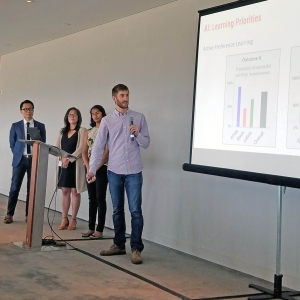Summer Program Brings Together Inquiring Minds and Artificial Intelligence to Solve World’s Problems
August 17, 2018 / by Maya Meinert- Research
What do homelessness, wildlife poaching and toxic stress have in common?
They’re societal problems being addressed with artificial intelligence.
The second class of summer fellows at the USC Center for Artificial Intelligence in Society used their time at the University of Southern California tackling some of these very issues. From deciding how best to allocate scarce resources to support homeless youth in Los Angeles to optimizing ranger patrol paths in national parks in Africa and Asia, the fellows took a novel approach using AI to solving some of the world’s most intractable problems.
“Linking AI to social problems opens new areas of scientific exploration and provides us with new opportunities to improve people’s lives,” said USC Suzanne Dworak-Peck School of Social Work Associate Professor Eric Rice, founding co-director of USC CAIS, a joint venture between the USC social work school and the USC Viterbi School of Engineering whose mission is to conduct research in AI to help solve the most difficult social problems.
Funded by Microsoft AI for Earth and Schmidt Futures, the USC CAIS summer fellows program included assistant professors, postdoctoral scholars and PhD candidates from all over the world.
“AI has a tremendous potential to address societal challenges that we face today around the world. However, that requires we bring together interdisciplinary scholars from different parts of the world, which we are absolutely thrilled to do at USC CAIS as part of our summer scholars program. As we come to the conclusion of this summer's program, it’s very gratifying to see the results of this interdisciplinary work,” said USC CAIS founding co-director Milind Tambe, the Helen N. and Emmett H. Jones Professor in Engineering and Professor of Computer Science and Industrial and Systems Engineering at USC Viterbi.
Technology for good
Among the projects explored this summer were two dedicated to creating data-driven policies to address homelessness, which brought together computer science and social work to develop a tool to allocate housing in an efficient, fair and easily interpretable fashion. Using publicly available data at a national level combined with qualitative interviews with homeless youth service providers, and soon the youth themselves in permanent supportive housing, the scholars are striving to create an artificially intelligent tool using human-centered design to better determine who should receive what type of housing and when. The model that’s currently being used nationwide places homeless youth into categories to make these decisions; the USC CAIS summer fellows want more detail on what happens to those youth once they’re in the system.
“Even though a high percentage of homeless youth are able to sustain in supportive housing, there are still disparities, including those along racial and ethnic lines,” said Hsun-Ta Hsu, PhD ’15, who is an assistant professor at the University of Missouri School of Social Work. “We want to address those disparities without sacrificing efficiency.”
Another project used communication principles to look at the use of in-person social networks in determining how best to disseminate information on HIV prevention among homeless youth. Other projects examined the use of AI in wildlife conservation efforts, including the implementation of drones and video tracking to improve the real-time detection of poachers, and the use of game theory to develop algorithms to compute an optimal allocation of resources and an optimal coordination strategy between human patrollers and mobile sensors.
Shivam Goel, a PhD student at Washington State University, used machine learning and computer vision techniques in an effort to save animals from poachers. Using drones to gather data that trains an algorithm to perform nighttime detections of poachers on real video feeds, Goel’s ultimate goal is to eventually provide this technology to park rangers who could use it to stop the poaching of wildlife once and for all.
“I have always reflected on using artificial intelligence to address complex real-world problems, and USC CAIS provided me the platform to work on the direction of making an impact in the real world,” Goel said. “I am grateful that I got a chance to work on a project that aims for a greater good and would love to keep working on things that help in shaping a better future.”
A smarter way to help
One project that developed out of a personal experience came from Sadiq Patel, a PhD candidate at University of Chicago School of Social Service Administration who is also completing a master’s degree in biostatistics. Patel, who has work experience as a science instructor through Teach for America and technology consult at Accenture, presented his project on the effect of neighborhood violence and poverty on stress reactivity among urban youth.
The majority of youth living in poor urban areas – between 50 and 96 percent – have experienced some form of serious violence, including witnessing shootings and homicides, that can result in toxic levels of stress leading to depression, post-traumatic stress disorder, behavioral issues, and even heart disease. Using home addresses and cortisol levels, Patel used a machine learning decision tree model to more accurately predict the effect of neighborhood violence on stress levels compared to more commonly used methods such as linear regression models.
“AI has the ability to identify how people’s daily environments impact their health and behaviors in ways that traditional statistical methods are unable to,” he said. “This research can better inform programs and policies that seek to improve the living conditions of society’s most disadvantaged groups.”
To reference the work of our faculty online, we ask that you directly quote their work where possible and attribute it to "FACULTY NAME, a professor in the USC Suzanne Dworak-Peck School of Social Work” (LINK: https://dworakpeck.usc.edu)
